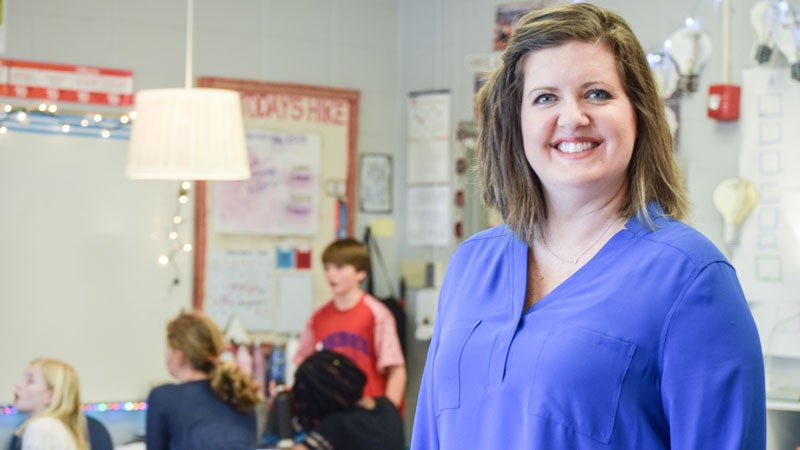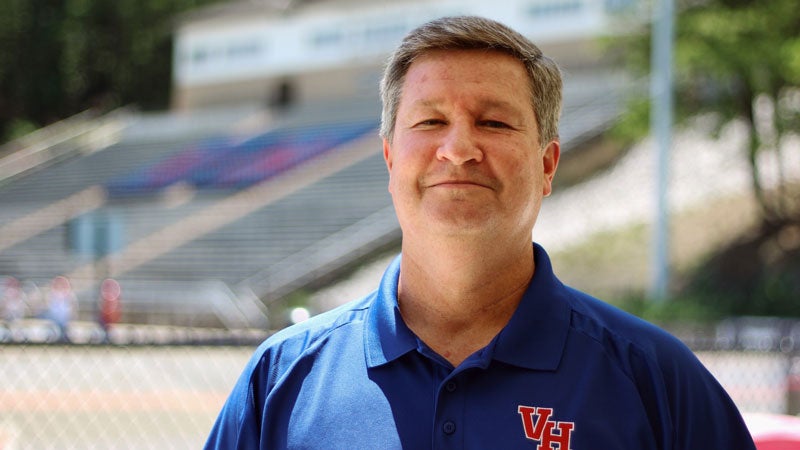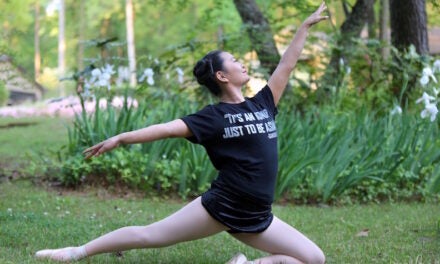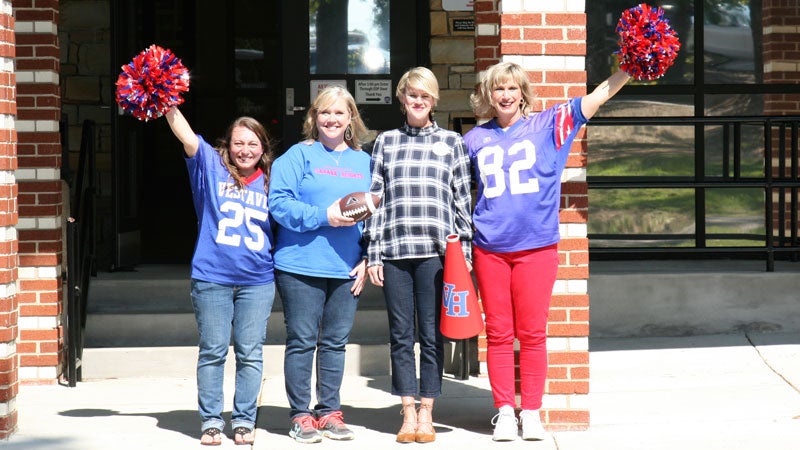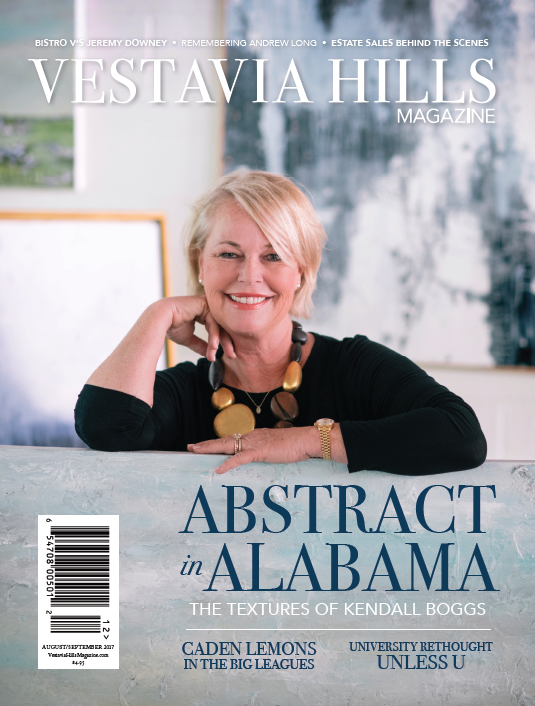It is a miserable, cold, rainy day at Vestavia Hills Elementary Central, and Heather Hurt is charged with teaching a room full of fifth graders to understand place value in numbers. But first, she has to get their attention. And keep it.
“Everybody grab a partner,” says Hurt, who won the Milken Educator Award last fall. Students look across their desks, trying valiantly to make sure they team up with a friend. This requires a little negotiation, and Hurt gives them a couple seconds to work it out.
“Point to your partner,” she adds, to make sure they’re all ready.
“Pointing is rude,” a boy proffers up, but Hurt does not take the bait.
“Yes, but in this case it’s okay,” she says, not letting things devolve into an etiquette discussion. She keeps them moving, on task.
From time to time, a student loses focus, falls out of a chair, or gets too chatty with a neighbor, and when that happens, she performs what educators refer to as a call and response. Many teachers say things like, “One, two, three, eyes on me!” and kids will respond, almost Pavlovian and in unison, by saying, “One, two, eyes on you!” It gets their attention.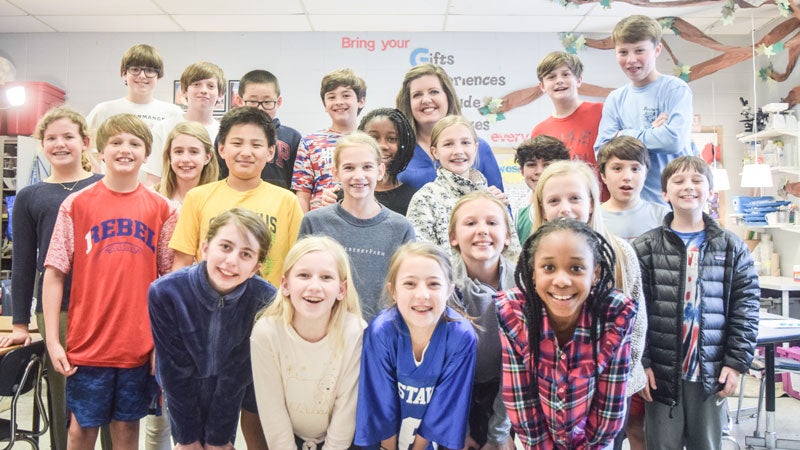
But in Hurt’s class, the call and response is a little cooler. “Alright, stop!” she says, and the kids chant back, “Collaborate and listen!” Which, in case you’ve been asleep for the last 30 years, is the opening to Vanilla Ice’s hypnotic, “Ice Ice Baby,” the first hip-hop song to hit number one on the Billboard Hot 100. (Suffice it to say, it’s legendary. And even kids today know it. And you’ll probably be humming the bass line all day now. You’re welcome. Dun-dun-dun, dunda-DUN-dun.)
And then everybody gets back to work.
Hurt teaches, math, science and social studies. But she teaches it a LOT differently than the way you probably learned it. First, there’s the math. Yes, they do teach fifth graders a different way to do long division than you and I (and the kids’ parents) probably learned. So, Hurt records her lessons and posts them online. “If they’re trying to do the standard algorithm at home, but we’re doing partial quotient here—most kids can’t make both (work).” It solves the problem of parents saying, “I don’t know how to do it that way. Just do it my way.”
But more than that, Hurt makes math fun. “Math is not fun for everybody,” she says, “but everybody can learn math.” Shortly after Valentine’s Day, instead of just doing their math problems on worksheets, Hurt decorated her classroom in red hearts and giant black Xs while the students were at P.E. and turned it into a game called Heartbreak Hitman when they returned. “Because the Heartbreak Hitman had come and taken away all the love,” she explains, “and they had to figure out (by doing these math problems) who it was.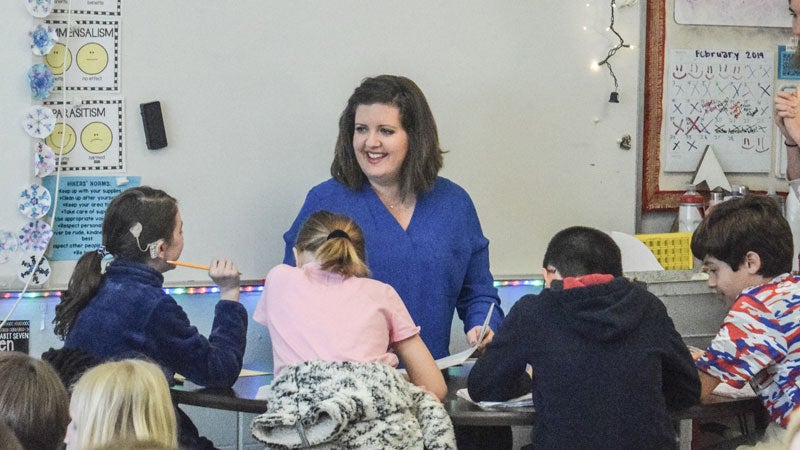
When her class reads the Balloons Over Broadway, a book about the history of the Macy’s Thanksgiving Day parade, they describe their own floats in an essay, and then design and build their own “floats” out of shoeboxes. But it doesn’t end there. The students program Lego robots to pull the floats down a school hallway for their own parade.
And they don’t just read about history, they live it. While learning about the Boston Tea Party, they role play with live actors via Skype at the Boston museum. Not content with that, Hurt has created the school’s first Colonial Days program, where students move between fifth-grade classrooms learning about colonial life and everything from ironworks to making candles.
Simply put, Hurt goes above and beyond. And it hasn’t taken her decades to create these activities. Hurt, who recently turned 40, has only been teaching for six years. She grew up in Vestavia, wanting to be a teacher her whole life, but took an indirect route getting here.
She graduated from Vestavia Hills High School in 1997, and went to the University of Alabama, declaring her major to be in education. But it didn’t stick. By the second semester she says something just didn’t feel right to her. She ended up graduating with a business degree and spent 10 years working as a Realtor. The pull to teach was always there, though. Even as a Realtor she sought certification so that she could instruct other Realtors. And, when time allowed, she found herself helping her sister-in-law, who is a teacher, and was always telling her she’d missed her calling.
One day, Hurt realized it, too. But it wasn’t too late. So, at 33, with a 3-year-old and a six-month-old, she enrolled in graduate school at Samford University for a Masters of Education. She hoped all along to get a job teaching an upper elementary grade. “Eleven year olds are my people,” she says, with a laugh.
Not only did she get an upper-elementary grade placement, but she got it at the very same school she attended as a child. Even more, she was assigned the exact classroom she sat in as a fifth grader. Like magic. Like it was always meant to be.
“I truly believe that I was called to do this,” she says. “It wasn’t an easy path to get here. But I think that all my experiences in life…have built up to this point, (and) that I think affects my classroom in a positive way.”
The Milken Educator Award
Teacher magazine calls it the Oscars of the Teaching world. For 30 years, the Milken Educator Awards have rewarded and inspired excellence in the world of education by honoring top educators around the country with $25,000 awards to be spent in any way they please. The Milken Educator Awards target early-to-mid career education professionals for their already impressive achievements and, more significantly, for the promise of what they will accomplish in the future.
Heather Hurt is the only Alabama teacher to win the award this year. She says she’s looking forward to attending her first Milken Conference, and says she plans to spend part of the award paying the application fee to become a Nationally Board Certified teacher.

